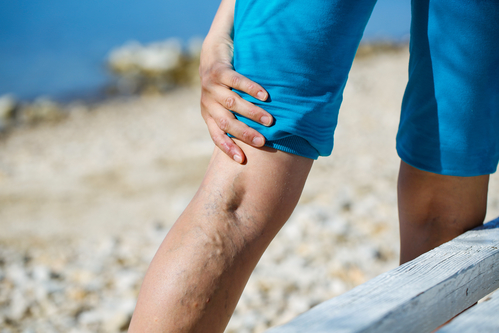“Protecting Legs During Summer
There are a few important areas when it comes to taking extra care here in the summer:
Healthy weight and lifestyle: While the heat might be placing more stress than you’d like on your veins, you can counter this by decreasing this stress through a healthy weight and overall lifestyle. Consider exercise whenever possible to help limit swelling. Aim for moderate activities like walking or cycling for 30 minutes a day, five days a week. This not only keeps your blood moving but also assists in managing your weight. Remember, a healthy diet rich in fruits, vegetables, whole grains, lean proteins, and low-fat dairy can reduce inflammation and improve overall vein health.
Compression therapy: There are stockings specifically designed for running and sports if you’re someone looking to build strength in the legs over the summer without overheating. You can even spray or soak your stockings if you want them cooler, providing not only support but also a refreshing relief. If you are unsure about the type and level of compression needed, consulting with a healthcare provider is advised to get a prescription that suits your needs.
Avoidance: If heat is a major issue for your venous issues despite the areas above, you can consider simply avoiding the hottest outside temperatures where possible. Stay indoors during peak sun hours, and if you must go outside, choose early morning or late evening hours. Make use of fans and air conditioning to keep your indoor environment cool. Taking cold showers or applying cooling towels can further help in reducing heat stress.
Additionally, it’s crucial to stay hydrated as being well-hydrated helps prevent the type of swelling and cramping associated with varicose veins. Avoid drinks high in sugars or alcohol and opt for water or hydrating electrolyte solutions instead.
Is Deep Vein Thrombosis Genetic?
Deep vein thrombosis (DVT) is a condition where blood clots form in deep veins, typically in the legs. While various factors can lead to DVT, genetics play a significant role in determining one’s risk.
Genetic Predisposition to DVT
Some individuals inherit genetic mutations that increase their likelihood of developing blood clots. For instance, mutations in the Factor V Leiden and prothrombin genes are well-documented contributors to an elevated risk of DVT.
Factor V Leiden Mutation: This is the most common hereditary risk factor for DVT. Those with the mutation experience resistance to activated protein C, a crucial blood clotting regulator.
Prothrombin Gene Mutation (G20210A): This mutation leads to higher levels of prothrombin, a protein essential for clot formation, thereby raising the propensity for clotting.
Genetic Conditions and DVT
There are also certain genetic conditions that can predispose individuals to DVT:
Antithrombin Deficiency: Antithrombin helps regulate blood clotting. A deficiency in this protein can significantly heighten the risk of clot formation.
Protein C and Protein S Deficiencies: These proteins work to prevent excessive blood clotting. Deficiencies or malfunctions increase the chances of DVT occurrence.
Family History’s Role
A family history of DVT is a strong indicator of genetic predisposition. If close relatives, such as parents or siblings, have experienced DVT, your risk is notably higher.
However, genetics is just one piece of the puzzle.
Other Risk Factors
Numerous non-genetic factors also contribute to DVT risk:
Immobility: Extended periods of immobility, such as long flights or bed rest, can lead to clot formation.
Surgery and Injury: Operations, especially those involving the lower body, or significant injuries can damage blood vessels and promote clotting.
Lifestyle Factors: Smoking, obesity, and certain medications, especially hormonal treatments like birth control, can amplify the risk.
Prevention and Management
Understanding your genetic predisposition can guide preventative measures. If you have a family history of DVT or known genetic mutations, consult with a healthcare provider:
Regular Monitoring: Routine check-ups and blood tests can help detect potential issues early.
Lifestyle Adjustments: Maintaining a healthy weight, staying active, and avoiding smoking can mitigate risk.
Medication: In some cases, anticoagulant medications may be prescribed to prevent clot formation.
Conclusion
While deep vein thrombosis can be hereditary, awareness of genetic and lifestyle factors enables effective prevention and management. If you suspect a genetic risk, speaking to a healthcare provider can provide personalized strategies to minimize your chances of developing this condition.
Lastly, don’t underestimate the importance of periodically elevating your legs. Lying flat on your back and putting your feet up on several pillows can significantly help in alleviating pain and swelling by encouraging blood flow back to the heart. This simple practice can provide relief and improve circulation, especially after long periods of standing or sitting.
By integrating these practices into your daily routine, you can significantly enhance your comfort and health during the hot summer months, ensuring that your legs remain strong and healthy.”<

